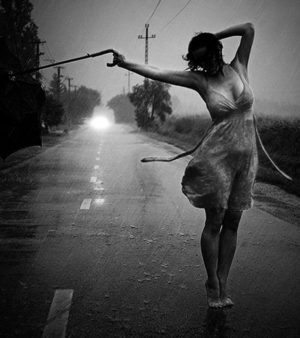You have no items in your cart. Want to get some nice things?
Go shopping As far back as you can remember, you’ve always been happiest on windy days. You were six, laying on the soft carpet of the den staring at the ceiling fan on it’s lowest setting, your Dad cooking in the kitchen, a door between you. The curtains in the corner of your vision are the first sign of the wind. They are thin, transparent and fluttering away from the darkening sky. Then the shutters fly shut, clack loudly and make you throw your hands to cover your ears. Even muffling your ears you can hear Dad from the other room shout about the wind bringing the rain into the valley. You stand up and move closer to the window. The shutters are half open now, where they stopped after bouncing on the frame. You can see the rain clouds and you know that Dad’s wrong. The wind is only there to push the clouds away.
As far back as you can remember, you’ve always been happiest on windy days. You were six, laying on the soft carpet of the den staring at the ceiling fan on it’s lowest setting, your Dad cooking in the kitchen, a door between you. The curtains in the corner of your vision are the first sign of the wind. They are thin, transparent and fluttering away from the darkening sky. Then the shutters fly shut, clack loudly and make you throw your hands to cover your ears. Even muffling your ears you can hear Dad from the other room shout about the wind bringing the rain into the valley. You stand up and move closer to the window. The shutters are half open now, where they stopped after bouncing on the frame. You can see the rain clouds and you know that Dad’s wrong. The wind is only there to push the clouds away.
You were eight, sitting on a bench in a park far from home in a foreign country. Mom and Dad aren’t in this memory, only you, feet dangling near the ground. If you point your toes, they can just reach the ground, but only if you lean way back against the bench and that bends your head forward in a weird way so you only do it once. Then the trees start to sigh with that sound that reminds you of ocean waves. You feel the air gust on your bare arms and your face and legs. You stare up and see the clouds moving quickly toward the horizon. You think that the wind must push the sun and the blue of the sky away every day to make room for the stars because you can’t remember it ever being too windy at night.
You were eleven, at Mom’s garden party you sat on the ledge of the stone fountain while the adults did the dance of civilized women. Dancing to the table for the tinniest snacks and dancing back to the thin, iron-wrought chairs painted white. You move your hard plastic shoes back and forth across the stone flooring surrounding the fountain to feel the grit of the tiny rocks scrape back and forth. Each scrape swishes the ugly dress Mom made you wear, because she says that she knows you’ll be crawling around in the grass at some point and green stains on knees aren’t as bad as green stains on pants.
Everything is bright and the sky is clear and you see the wind coming before they do. You see ripples in the lake beyond the garden. You see the trefoils bend, each flower like a yellow finger points straight at the party. The very first gust topples the folded napkin tower which explodes but in an organized way that reminds you of Dad’s printer when pages fly out the side but the napkins don’t land in a pile; they land on the drink tray, toppling delicate glasses, and the adults shriek and everyone runs to the table and no one notices you staring intently at the half finished wine bottles because there’s a kind of long, hollow music coming from them. Later you steal a bottle from the recycling and you push your lips together to find that you can breath music into the bottles just like the wind can, and for many years afterward, you’ll find yourself thinking that the wind taught you more about love and beauty than anything else in your life and you’ll always find comfort in flapping curtains and waving wheat fields and you’ll never tell anyone about the rhapsodies of happiness you feel whenever the trees sigh.
About Jack P
Jack P. is an American writer living in Sydney, Australian. His stories and book reviews have appeared in both print and digital mediums.




